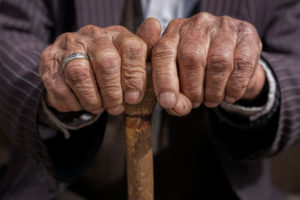Parkinsonism
 Parkinsonism is a term used to describe any neurological condition that causes symptoms similar to that of Parkinson’s disease. These symptoms often include tremors, stiff muscles, and balance problems.
Parkinsonism is a term used to describe any neurological condition that causes symptoms similar to that of Parkinson’s disease. These symptoms often include tremors, stiff muscles, and balance problems.
Parkinson’s disease is a type of Parkinsonism and the most common cause of its symptoms. Parkinson’s disease accounts for 70% of all diagnosed cases of Parkinsonism. However, Parkinson’s disease is a neurodegenerative illness, whereas Parkinsonism is used to describe a neurological syndrome, or collection of observable symptoms. Because there are many types and possible causes of Parkinsonism, doctors must do a thorough assessment before offering a diagnosis.
What Is Parkinsonism?
Parkinsonism, also referred to as atypical Parkinson’s or secondary Parkinson’s, covers a wide range of neurological issues that share a common core of symptoms. These classic symptoms are referred to as TRAP symptoms. TRAP stands for tremor, rigidity, akinesia, and postural instability.
What Causes Parkinsonism?
It is sometimes difficult to pinpoint the exact cause of Parkinsonism. Researchers believe both genetic and environmental factors play a part in Parkinsonism. Although there are many types and many possible causes, researchers know dopamine-producing cells are affected in every form of Parkinsonism. This causes problems with the body’s ability to control movement.
Some of the known health problems associated with the condition include, but are not limited to:
- Multiple system atrophy
- Progressive supranuclear palsy
- Viral encephalitis
- Stroke
- Dementia
- Traumatic brain injury
- Brain tumors
- Substance abuse
- Industrial toxin poisoning
Symptoms of Parkinsonism
Parkinsonism and Parkinson’s disease have several symptoms in common. However, symptoms of the various types of Parkinsonism extend beyond those of Parkinson’s Disease.
Common symptoms for Parkinson’s and Parkinsonism:
- Resting tremor
- Stiff muscles or rigidity
- Slow movements
- Postural instability
- Akinesia or loss of voluntary movement
- Restlessness, agitation, and discomfort
- Cognitive changes
Symptoms unique to Parkinsonism (Non-Parkinson’s):
- Memory loss
- Low blood pressure
- Urinary problems
- Aphasia or the inability to understand spoken/written language
- Apraxia or the inability to complete simple tasks
- Muscle spasms
- Difficulty moving the eyes
- Voice problems, swallowing difficulty, and drooling
- Problems with gait
Parkinsonism and Mental Health
There are many medical treatment options available for people diagnosed with Parkinsonism. These options include:
- Discontinuation of symptom-causing drugs
- Medication for symptom relief
- Physical therapy
- Occupational therapy
- Healthy nutrition and regular exercise
- Surgery
- Rehabilitative therapy
In addition to the medical treatments above, mental health treatment from a qualified therapist or counselor should also be considered. Symptoms of Parkinsonism are painful, exhausting, and usually progressive. Changes in mobility and appearance can affect self-esteem and lead to debilitating mental health issues.
Not only do those in treatment and their loved ones experience cycles of grief and loss, but those diagnosed with Parkinsonism are also at risk for other mental health issues. For example, depression and anxiety are common among people diagnosed with Parkinson’s and other atypical forms, and some studies show depression is linked to a faster progression of symptoms.
Mental health treatments that may be helpful include:
- Cognitive behavioral therapy
- Family therapy
- Art therapy (can aid in communication, stress reduction, and treatment of depression and anxiety)
- Couples counseling
- Grief counseling
The above therapies may be instrumental in the healing process and can provide beneficial support for those adjusting to their parkinsonism diagnosis.
References:
- American Friends of Tel Aviv University. (2013, January 14). Parkinson’s treatment can trigger creativity: Patients treated with dopamine-enhancing drugs are developing artistic talents, doctor says. Science Daily. Retrieved from http://www.sciencedaily.com/releases/2013/01/130114111622.htm
- Arehart-Treichel, J. (n.d.). Psychiatric treatment crucial for many Parkinson’s patients. Psychiatric News. Retrieved from http://psychnews.psychiatryonline.org/doi/full/10.1176%2Fpn.47.2.psychnews_47_2_29-a
- Dobkin, R. D., Menza, M., & Bienfait, K. L. (2008, January). CBT for the treatment of depression in Parkinson’s disease: A promising non-pharmacological approach. National Institute of Health Public Access Author Manuscript, 8(1), 27-35. doi:10.1586/14737175.8.1.27
- Lindop, F., Brown, L., Graziano, M., & Jones, D. (2014, April). Atypical Parkinsonism: Making the case for a neuropalliative rehabilitation approach [Electronic version]. International Journal of Therapy & Rehabilitation, 21(4), 176-182.
- Parkinson’s disease and Parkinsonism: Are they the same?. (2014). In Parkinson’s Action Network. Retrieved from http://parkinsonsaction.org/about-pan/parkinsons-disease/parkinsons-disease-and-parkinsonism-are-they-same-thing
- Porter, R. S., Kaplan, J. L., & Homeier, B. P. (Eds.). (2009). Anxiety disorders. The Merck Manual Home Health Handbook (3rd ed., p. 777). West Point, PA: Merck & Co.
- Understanding Parkinson’s. (n.d.). The Michael J Fox Foundation for Parkinson’s Research. Retrieved from https://www.michaeljfox.org/understanding-parkinsons/supporting-caregiving.php
- Weiner, W. J., Shulman, L. M., & Lang, A. E. (2013). Parkinson’s Disease (3rd ed.). Baltimore, MD: The Johns Hopkins University Press.
- What are the different types of atypical Parkinsonism syndromes?. (n.d.). National Parkinson’s Foundation. Retrieved from http://www.parkinson.org/Parkinson-s-Disease/Diagnosis/What-are-the-different-types-of-atypical-Parkinson
Last Updated: 04-10-2018
- 1 comment
- Leave a Comment
-
Mary
August 28th, 2019 at 11:24 AMLyme Disease and the encephalopathy which may result can also later manifest as Parkinsonian symptoms, but may still resolve with proper diagnosis and treatment with antibiotics. Erly treatment is key to fullest recovery from LD.
Leave a Comment
By commenting you acknowledge acceptance of GoodTherapy.org's Terms and Conditions of Use.

